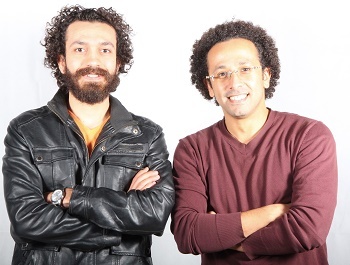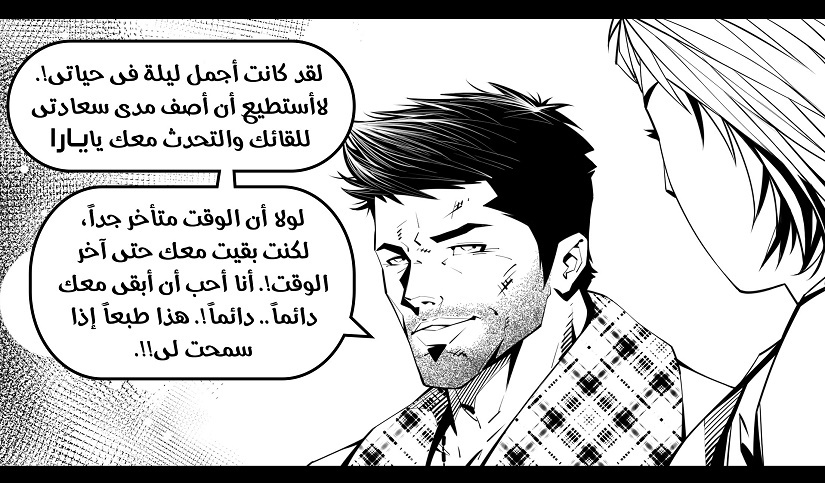Egyptian superhero startup wants to save comics

Koshk Comics has a plan to take over the world, but unlike the nefarious comic villains who normally wield that line they’re aiming more for the superhero tag.
It’s a mobile-first platform into which comic artists can upload their work, with the option to sell it and share 40 percent of the profits with Koshk. Readers access the episodes through the app.

incubation round in October 2015 and cofounders Mostafa
Saadani (left) and Amr Hussein (right) extended
their stay by a year, giving them free access to AUC facilities
for events. (Image via AUC Egypt)
"Our goal is to [give artists] a commercial alternative, to attract them to do more effort in that direction, to make it worth it, to make some kind of profession called a comic artist," cofounder Amr Hussein told Wamda.
He’s tapping into an underground culture by promoting Arabic comics. Egyptian website Comics Gate, founded in 2008, is built on a similar premise to Koshk, offering digital comic books, and magazines like Garage and Toktok give artists access to print publications.
Major events are also held throughout the region, such as the Middle East Film and Comic Con in Dubai which had its fifth anniversary in April, and the International Comics Festival of Algiers in Algeria has been going since 2008.
But comics that do make it sometimes take heavy fire from the authorities.
The 99 came in for a battering (and a lawsuit) for its heroes named after God, while Samandal in Lebanon was sued out of circulation on religious grounds.

Hussein's first steps have been to uncover the network of artists that crisscross the Middle East and extend that overseas, to cement Koshk’s business proposition as an international indie comic platform.
Offline adventures and offshore expeditions
In 2014 Hussein wanted to develop a flagship product for his business Color Company, and after some testing, his team found that short, online comics struck a chord with Egyptians.
They built an app, which is only really in the hands of “friends and friends of friends” yet, and began sourcing artists through offline events like the comic festival in October last year which identified up to 400 artists in Egypt and the two exhibitions held this year.
Hussein and his cofounder Mostafa Saadani began with the regional market in mind, attracting artists from Morocco to Lebanon to the festival, and is now looking global.

The foreign adventures began in April this year at the Fumetto Festival in the Swiss city of Lucerne, and at the Global Innovation through Science and Technology (GIST) pitch competition during the Global Entrepreneurship Summit in June.
Koshk has signed a deal with Swiss organization Pro Helvetia Cairo to host a week-long workshop between Swiss and Egyptian artists and with Dar Salama to translate selected works into Arabic. The second trip secured a coveted foothold in the US.
A US pivot
Hussein is about to start looking for pre-seed investment of $500,000 to allow the founders to quit part time jobs.
What he got from the US foray was advice on how to pitch his company to investors as a global, rather than Egyptian startup from Christopher Schroeder and Priceline cofounder Jeff Hoffman.
“The very first questions they asked were how will the comic content that you are going to translate and put in other places be convenient to [foreign readers] without being offensive or even understandable," Hussein said. "[And] we have to see very, very clear channels that secure distributing this product in different countries.”

Although Koshk is outsourcing the translation, they will control the editing in order to make sure foreign readers understand obscure local phrases such as ‘pass by tomorrow’ or ‘taking someone behind the chair factory’.
Both are colloquial Egyptian, the former a satirical poke at Egypt’s notoriously slow bureaucracy, and the latter a reference to a disused chair factory in Cairo where lovers once congregated for privacy, but also slang for humiliating someone.
Lamis
Koshk has six books on the app and one of the most recent is Lamis.
It’s a strip about a woman, Lamis, who is a powerful drug dealer in Cairo. Although the first episode conveyed a noble side Lamis is a much darker, distinctly human character, more so than another Cairene superheroine Qahera, who battles misogyny in the Egyptian capital, or Joumana Medlej's Lebanese Malaak: Angel of Peace.

Lamis’ creator, Safia Baraka, told Wamda the story was inspired by her own mother, a single mom who raised Baraka in the face of heavy social pressure, and an Arab society that doesn’t forgive women who make mistakes.
“I was raised on stories about this kind of treatment, so [we] focus on it being OK for women to make mistakes,” she said. ‘[They shouldn’t] be stamped for life for mistakes because [they] will be scared to take risks.”
Both directors, Baraka and her husband Hamed originally wanted to turn the idea into a movie but the financial cost pushed them to look for other outlets.
“It was a good decision because a digital platform is very useful for everyone now, because everyone is holding their mobile and iPad 24/7.”
Hussein said the artwork was well suited to the smallest screen. Each panel shows on a new screen enabling the Barakas to focus on small but evocative details, such as the blink of an eye, in each panel.
Lamis garnered Koshk an extra 200 app downloads following positive media coverage, pushing it up to 1,700 now on Android and iPhone.
Another artist, Kareem Ahmed, is also an early feature on Koshk. Hussein called the Dani strip the “first purely futuristic comic” they’d seen, similar in style to US artwork with an imagining of what the region could be in 60 to 80 years.
Hussein expects downloads to hit 5,000 by early next year after their first marketing campaign starts at the end of 2016, two and a half years after the initial idea.
No one ever said good art didn’t take time.
[Feature image: The comic strip Dani via Koshk Comics]


